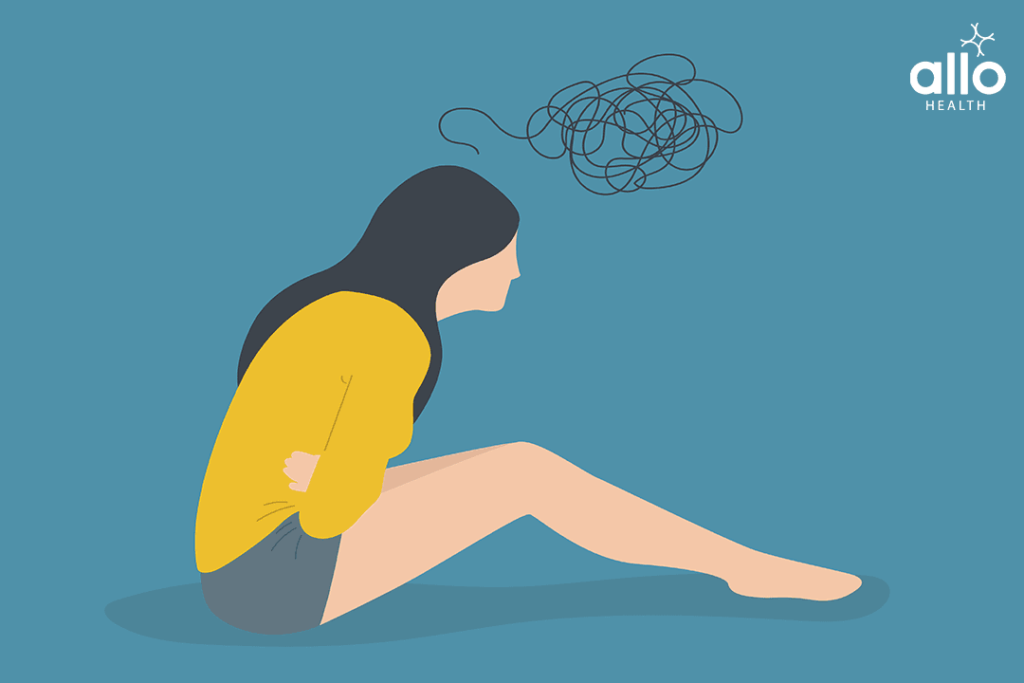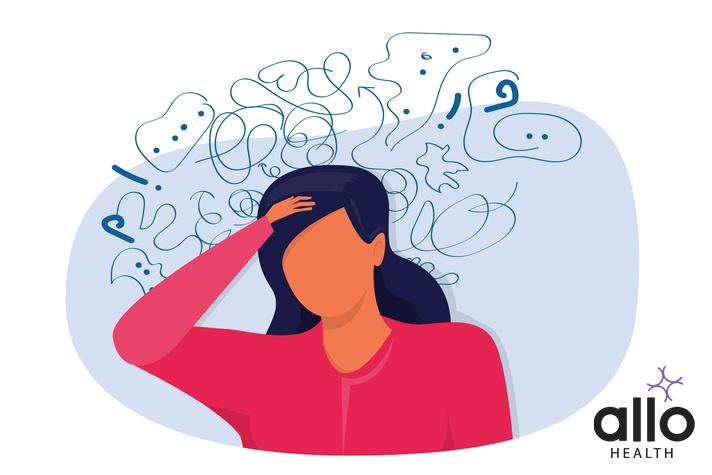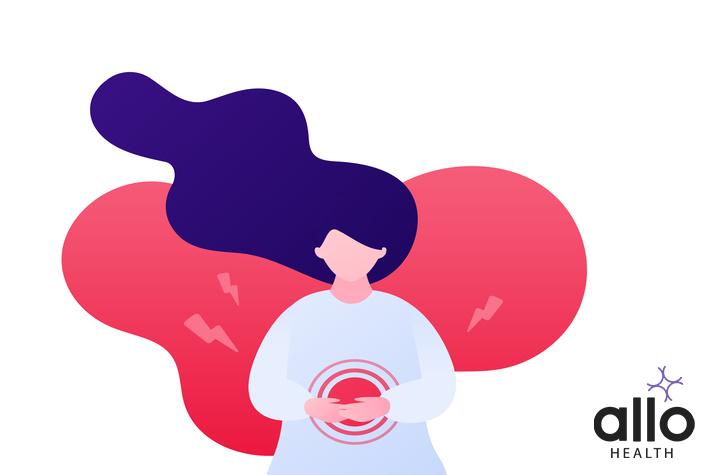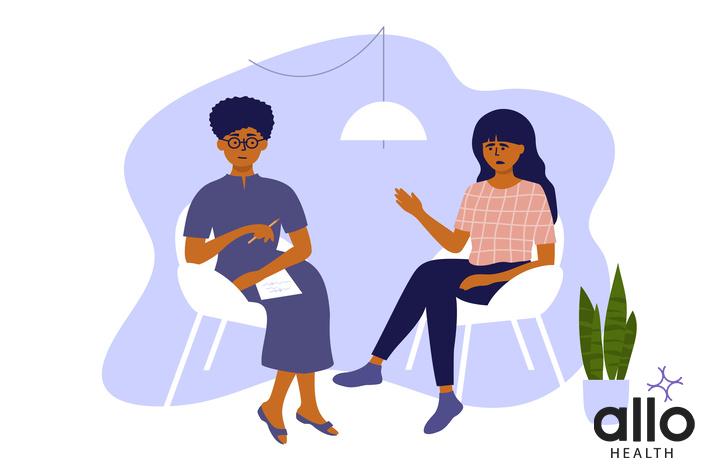What Is The Meaning Of Vaginismus?

Allo Health is dedicated to personalized well-being, offering support and trusted information tailored to individual health goals. The platform emphasizes human-generated content, led by a distinguished medical team of experts, including physicians and sexual health specialists. Their commitment to credibility involves rigorous fact-checking, authoritative research, and continuous updates to ensure accurate, up-to-date information. Allo Health's unique approach goes beyond conventional platforms, providing expert-led insights and a continuous commitment to excellence, with user feedback playing a crucial role in shaping the platform's authoritative voice.

An early career psychiatrist with extensive experience in general adult psychiatry, relationship issues, psychosexual problems & special interest in sexual medicine, disorders with addictive behaviours and Obsessive Compulsive disorders. He is an astute physician with excellent academic record and research experience. He is also a member of World Health Organisation and World Psychiatric Association. His vision and goal for Allo is an inclusive, accessible digital health clinic for psychosexual difficulties.
Why This Was Upated?
Our experts continually monitor the health and wellness space, and we update our articles when new information became available.
Updated on 12 June, 2024
- Article was updated as part of our commitment to diversity, equity, and inclusion.

"The following blog article provides general information and insights on various topics. However, it is important to note that the information presented is not intended as professional advice in any specific field or area. The content of this blog is for general educational and informational purposes only.
Book consultation
The content should not be interpreted as endorsement, recommendation, or guarantee of any product, service, or information mentioned. Readers are solely responsible for the decisions and actions they take based on the information provided in this blog. It is essential to exercise individual judgment, critical thinking, and personal responsibility when applying or implementing any information or suggestions discussed in the blog."
Vaginismus commonly referred to psychogenic vaginismus is a condition that affects a person’s ability to have sexual intercourse or undergo gynecological exams. It is characterized by involuntary vaginal muscle spasms or vaginal spasm, resulting in painful intercourse. The prevalence of vaginismus in the Indian context is not well documented due to the limited number of researches done on the topic, however, it is believed to be a very common condition among the Indian female population.
The exact cause of vaginismus is not fully understood, but it is thought to be a combination of physical and psychological factors:
- Physical causes may include injury or irritation to the vagina, infections like bacteria or yeast infections, or the use of certain medications.
- Psychological causes may include past sexual abuse, negative attitudes towards sex, other emotional factors or relationship concerns.
Types of Vaginismus & Symptoms
There are several types of vaginismus, each with their own unique causes and treatment methods.
Primary vaginismus
Primary vaginismus is a type of vaginismus occurs when a woman has never been able to have successful penetration due to the involuntary spasms in vaginal muscles. This can be due to fear or anxiety about sex, a history of sexual abuse, or a lack of sexual education.
Secondary vaginismus
Secondary vaginismus is a type of vaginismus develops after a woman has previously been able to have successful penetrative intercourse. It can be caused by a variety of factors, including vaginismus after menopause, childbirth, surgery, or a sexually transmitted infection.
Global vaginismus
This is the most severe form of vaginismus, in which the muscles spasm not just during penetration, but also during any kind of vaginal exam or insertion, including tampon use and gynecological exams.
Partial vaginismus
This type of vaginismus involves muscle spasms that only occur during certain types of penetration, such as penetration with a penis or finger, but not with a tampon or speculum.
Sub-Types of Vaginismus & Symptoms
Generalized Vaginismus
Generalized vaginismus is when muscle spasms occur with any attempt at vaginal penetration, including sexual intercourse, gynecological exams, and tampon insertion. This type of vaginismus can be especially distressing because it can make it difficult or impossible for a person to engage in sexual activity or even undergo necessary medical procedures.
Situational Vaginismus
Situational vaginismus is when muscle spasms only occur in specific situations, such as with certain sexual positions or partners. This type of vaginismus may be less severe than generalized vaginismus, as it only occurs in certain situations rather than all the time. However, it can still be a significant source of distress and may impact a person’s sexual and reproductive health.
Provoked Vaginismus
Provoked vaginismus is when muscle spasms only occur with certain types of touch or pressure, such as during a gynecological exam. This type of vaginismus may be the least severe, as it only occurs in certain specific situations. However, it can still cause discomfort and may make it difficult for a person to seek necessary medical care.
Causes Of Vaginismus

Psychiatric Causes
While there is no one specific cause of vaginismus, psychiatric causes may play a role in the development of this condition.
Past trauma Or abuse
If a woman has experienced sexual abuse or assault, it can cause a negative association with sexual activity, leading to a physical response of muscle spasms in the vagina. This can also be the case for women who have experienced other forms of trauma, such as physical or emotional abuse.
Anxiety Or stress
If a woman is anxious about sexual activity, it can cause muscle tension and lead to vaginismus. This can be due to concerns about performance, body image, or past negative sexual experiences.
Relationship Concerns
If a woman is not comfortable with her partner or is experiencing relationship problems, it can cause anxiety and lead to vaginismus.
It is important to note that vaginismus can also have physical causes, such as irritation or infection. It is important to speak with a healthcare provider to determine the specific cause behind your symptoms or concerns, and determine the best management of vaginismus.
Physical Causes
While most commonly Vaginismus is an output of psychological or psychiatric causes, physical conditions, such as infections or skin conditions in the genital area, can also contribute to vaginismus. Women who have conditions such as vulvodynia (chronic pain in the vulva) or lichen sclerosus (a skin condition that affects the vulva) may experience discomfort or pain during penetration, leading to vaginismus.
Diagnosis Of Vaginismus

Vaginismus is commonly diagnosed by a professional that has thoroughly understood their patient’s symptoms/signs and medical history. There is a criteria for vaginismus diagnosis. The doctors may suggest a physical exam/pelvic examination by a gynaecologist to diagnose/ rule out other possible causes of their patient’s symptoms such as any infections. The criteria for diagnosis emphasizes on this.
Symptoms of Vaginismus
Symptom of vaginismus may include difficulty inserting tampons, discomfort or painful vaginal penetration during sex, and difficulty or pain during gynecological exams due to involuntary tightening of vaginal muscles. It is important to seek medical attention if you are experiencing these symptoms, as vaginismus can have a significant impact on a person’s quality of life and sexual health.
Treatment of Vaginismus
Treatment or interventions for vaginismus may include relaxation exercises such as pelvic floor muscle exercises or breathing exercises, therapy to address any underlying psychological concerns, and the use of dilators to gradually stretch the muscles of the vagina. With proper treatment, most people with vaginismus are able to overcome the condition and resume a healthy and satisfying sex life.
There are several types of cognitive therapies that may be used to treat vaginismus, one of which is Cognitive therapy or CBT. There are several types of cognitive therapies that may be used to treat vaginismus, including cognitive-behavioral therapy (CBT) and acceptance and commitment therapy (ACT). These therapies focus on changing negative thought patterns and behaviors that contribute to the condition.
While cognitive therapies can be an effective treatment option, it’s important to remember that they are just one part of a comprehensive approach to managing vaginismus. Other treatments may include pelvic floor physical therapy, behavior therapy, use of vaginal dilators, medication, and communication and relationship counseling with a partner. It’s important to work with a healthcare professional to determine the best treatment plan for your needs.
Couples Psychotherapy For Vaginismus
Couple psychotherapy can be an effective treatment option for vaginismus. This type of therapy involves both partners working with a therapist to address the underlying causes of the condition and develop strategies for managing it.
One of the main goals of couple psychotherapy for vaginismus is to help the partners communicate more effectively about their desires and concerns. This can include discussing past experiences that may have contributed to the development of vaginismus, as well as exploring ways to express and fulfill each other’s sexual needs.
Another important aspect of couple psychotherapy is addressing any negative patterns of behavior or communication that may be contributing to the condition. This may involve working with a sex therapist to identify and change negative beliefs or behaviors that are impacting the relationship.
In addition to addressing the underlying causes of vaginismus, couple psychotherapy may also involve the use of relaxation techniques and other strategies to help manage the physical symptoms of the condition. This can include pelvic floor muscle exercises and the use of lubricants or other types of sexual aids.
Overall, couple psychotherapy can be a valuable treatment option for women with vaginismus and their partners. By addressing the underlying causes of the condition and developing strategies for managing it, couples can improve their communication and strengthen their relationship.
Vaginismus Prognosis
There is no known cure for vaginismus, but the condition can be managed and treated with the help of a healthcare provider. Treatment options may include psychological therapy, relaxation techniques, and progressive muscle relaxation exercises to help manage muscle spasms. In some cases, dilators may be used to slowly stretch the muscles of the vagina, allowing for easier penetration.
Prognosis for vaginismus can vary from person to person. Some individuals may see significant improvement in their symptoms with treatment, while others may experience ongoing difficulties with penetration. It’s important for individuals with vaginismus to work closely with a healthcare provider and to be patient and consistent with treatment to see the best results.
It’s also important for individuals with vaginismus to have open and honest communication with their sexual partner and to seek support from friends and loved ones. Vaginismus can be a difficult and isolating condition, but with the right support and treatment, it is possible to improve symptoms.

Conditions Similar To Vaginismus
Vaginismus is a condition that causes the muscles in the vagina to involuntarily tighten or a vaginal spasm, making sexual intercourse or insertion of a tampon painful or impossible. While vaginismus is a specific condition, there are several other conditions that can cause similar symptoms and may be mistaken for vaginismus. Here are some conditions that are similar to vaginismus:
Pelvic floor dysfunction
The pelvic floor muscles, which support the uterus, bladder, and rectum, can become weakened or tight due to pregnancy, childbirth, surgery, or other factors. This can lead to pain during sex or difficulty with inserting tampons.
Vulvodynia
This condition causes chronic pain in the vulva, the external female genitalia, without a specific cause. The pain can be triggered by touch or pressure, including during sexual activity.
Vestibulodynia
This type of vulvodynia causes pain at the entrance to the vagina, known as the vestibule. The pain may be triggered by touch or pressure, including during sexual activity.
Lichen Sclerosus
This condition causes thinning and scarring of the skin of the vulva and can cause pain during sex or difficulty with inserting tampons.
Genital Herpes
This sexually transmitted infection can cause painful sores or blisters on the vulva, which can make sexual activity or insertion of tampons painful.
It’s important to see a healthcare provider if you are experiencing any of these symptoms. They can diagnose the underlying cause and provide treatment to help alleviate the pain and discomfort. Treatment may include medication, physical therapy, or psychological therapy.
Does Vaginismus Lead To Unconsummated Marriages?
Vaginismus can be a distressing and isolating experience for those who suffer from it, and it can also have a significant impact on a couple’s relationship, especially if they are in an unconsummated marriage.
There are several potential causes of vaginismus, including past sexual trauma, anxiety or fear of sexual intimacy, and medical conditions such as vulvodynia or urinary tract infections. It is important for individuals with vaginismus to seek medical and/or psychological treatment in order to address the root cause of the issue and find effective ways to manage the condition.
While it is not uncommon for people with vaginismus to have an unconsummated marriage, it is important to note that this is not always the case.
Unconsummated marriages, also known as “sterile” or “invalid” marriages, are those in which the couple is unable to have sexual intercourse due to a physical or psychological barrier. In some cases, unconsummated marriages may be caused by vaginismus or other sexual dysfunctions that make penetration difficult or impossible. However, there are also many other potential causes of unconsummated marriages, including medical conditions, cultural or religious beliefs, and relationship concerns.
If you are in an unconsummated marriage and believe that vaginismus may be a factor, it is important to speak to a healthcare provider for proper diagnosis and treatment. Treatment for vaginismus may involve psychological therapy, medication, and relaxation and stretching exercises, and can be effective in helping people with this condition achieve successful sexual activity. It is also important to address any other potential causes of unconsummated marriages, such as relationship concerns or cultural or religious beliefs, as these can often be addressed through communication and understanding.
While vaginismus can sometimes lead to unconsummated marriages, it is not the only potential cause. If you are experiencing difficulties with sexual activity, it is important to speak to a healthcare provider for proper diagnosis and treatment.
Does Vaginismus Affect Intimacy?
One of the main ways that vaginismus affects intimacy is by causing pain during sexual activity. This can make it difficult or impossible for a person with vaginismus to enjoy sexual activity and can lead to avoidance of intimacy altogether. In addition to the physical discomfort, the fear of penetration can also be emotionally distressing, which can further impact intimate relationship.
Vaginismus can also cause difficulties with communication in a relationship. It can be difficult for a person with vaginismus to talk about their condition with their partner, and this can lead to misunderstandings and frustration. It is important for both partners to be open and honest about their feelings and needs in order to maintain a healthy relationship.
Attitudes and Religious Beliefs
It’s important to note that some religious beliefs may impact a person’s understanding and treatment of vaginismus. For example, some religions view sex as a sacred and private act, and the idea of seeking help for a sexual issue may be viewed as taboo or shameful. It’s important for individuals to understand and recognize their own beliefs and values and to find a healthcare provider who is sensitive to these beliefs and can provide treatment options that align with them.
Vaginismus is a condition in which a person experiences involuntary muscle spasms in the pelvic floor muscles, making any type of vaginal penetration, including sexual intercourse, extremely painful or impossible. It is one of the sexual disorders that can have physical and psychological causes and can significantly impact a person’s overall well-being and sexual satisfaction.
There are a wide range of attitudes and beliefs about sex and sexuality that can contribute to the development and maintenance of vaginismus. Some people may hold negative beliefs about sex and their own bodies, such as feeling ashamed or embarrassed about their genitalia or sexual desires. These negative attitudes can lead to discomfort or avoidance of sexual activity, which can eventually lead to muscle spasms and pain during attempted penetration.
Cultural and societal attitudes about sex and gender roles can also play a role in the development of vaginismus. For example, some people may feel pressure to conform to certain expectations about their sexual behavior or to meet the desires of their partner, which can cause anxiety and lead to muscle tension and pain during sexual activity.
It is important for people with vaginismus to understand that their condition is not their fault and that there are effective treatment options available. Seeking the support of a mental health professional or a medical provider trained in treating sexual dysfunction can be helpful in addressing the underlying causes of vaginismus and finding ways to manage the condition.
In addition to seeking professional help, it can also be helpful for people with vaginismus to educate themselves about their bodies and sexual health, and to communicate openly with their partners about their needs and concerns. Engaging in self-care practices, such as relaxation techniques and pelvic floor exercises, can also be helpful in managing muscle tension and improving sexual function.
Overall, it is important to recognize that everyone’s attitudes and beliefs about sex and sexuality are unique and personal, and that it is okay to have a wide range of experiences and desires.
When To See A Doctor For Vaginismus?
Vaginismus is a condition that causes involuntary muscle spasms in the vagina, making sexual intercourse and other forms of vaginal penetration painful or impossible. It is a common and treatable condition, but it can have a significant impact on a person’s sexual and reproductive health. If you are experiencing symptoms of vaginismus, it is important to see a doctor as soon as possible to receive a proper diagnosis and treatment.
There are several signs that you should see a doctor for vaginismus:
Pain during intercourse
If you experience pain during sexual intercourse or other forms of vaginal penetration, it could be a sign of vaginismus. This pain can range from mild discomfort to severe, and it can be physical or emotional in nature.
Difficulty With Tampon Use
If you have trouble inserting tampons or find them painful to use, it could be a sign of vaginismus.
Difficulty With Gynecological Exams
If you have difficulty with gynecological exams or find them painful, it could be a sign of vaginismus.
Decreased sexual desire
Vaginismus can lead to a decrease in sexual desire, as the fear of pain or discomfort during intercourse can be a deterrent.
Difficulty becoming pregnant
Women with vaginismus can find it difficult or impossible to become pregnant, as the muscle spasms can prevent the sperm from reaching the cervix.
If you are experiencing any of these symptoms, it is important to see a doctor as soon as possible. A healthcare provider can diagnose vaginismus and provide treatment options, which may include therapy, medication, and/or pelvic floor muscle exercises. It is important to remember that vaginismus is a treatable condition and seeking treatment can improve your sexual and reproductive health.
Frequently Asked Questions
Q: Can Vaginismus Lead To Infertility?
A: While it isn’t right to say that Vaginismus has a direct impact on fertility, the symptoms that it causes can do so. Women who experience symptoms experience intense discomfort and pain during penetrative sexual intercourse. This makes penis penetration impossible – something that is needed for sperm to be ejaculated into the vagina for conception to be possible. Due to this, some women who have Vaginismus may struggle with infertility because they are unable to consummate their marriage, and therefore are unable to
conceive.
Q: What complications can Vaginismus lead to?
A: While Vaginismus isn’t particularly dangerous to your physical health, the involuntary condition can drastically affect your mental and emotional health. Due to this, many individuals or couples can experience some complications due to their symptoms, such as:
- Interpersonal relationship problems: The inability for vaginal penetration to happen can take a toll on a relationship, especially if the couple is trying to conceive.
- Pain during medical exams: Since the vaginal muscles tighten during pelvic exams as well, individuals can experience discomfort and emotional distress. This can lead to them hesitating to conduct – very essential – pelvic exams.
Q: Can vaginismus be cured? What is lifelong vaginismus?
A: Vaginismus can often be successfully treated and resolved with the right combination of therapy and medical intervention. However, it may take time and patience to see improvement.
Lifelong vaginismus is a chronic condition. It typically persists throughout a person’s life, often causing significant distress and affecting their sexual and intimate relationships. Treatment options may include physical therapy, counseling, and gradual desensitization techniques.
Q: Is it possible to have a healthy sex life with vaginismus?
A: It is possible to have a healthy and fulfilling sex life with vaginismus, but it may require seeking treatment and finding ways to manage the condition. It is important to remember that every person is different and what works for one person may not work for another.
Q: What doctors treat Vaginismus?
A: If you are experiencing symptoms of vaginismus, it is important to see a healthcare professional for proper diagnosis and treatment. Some professionals who may be able to help include:
- Gynecologist: A gynecologist is a medical doctor who specializes in the female reproductive system and can diagnose and treat vaginismus.
- Urologist: A urologist is a medical doctor who specializes in the urinary and reproductive systems and can diagnose and treat vaginismus.
- Physical therapist: A physical therapist can help with pelvic floor muscle exercises and other physical treatments for vaginismus.
- Psychologist or therapist: A psychologist or therapist can help address any psychological concerns that may be contributing to vaginismus, such as anxiety or a history of sexual abuse.
Q: What types of therapy for vaginismusare there?
A: Yes, some common forms of therapy used to treat vaginismus include: Cognitive behavioral therapy (CBT), Psychodynamic therapy and Sex therapy .It is important to find a therapist who is trained and experienced in working with individuals with vaginismus, and who you feel comfortable talking with about sensitive and personal cancers. Don’t be afraid to ask questions and speak up during therapy sessions to ensure that you are getting the support you need.
Q: Is Vaginismus a sexual pain disorders?
A: Yes, Vaginismus is a sexual pain disorder that affects a person’s ability to engage in any form of vaginal penetration, including sexual intercourse, tampon insertion, and gynecological exams. It is caused by involuntary muscle spasm of the pelvic floor muscles, which can make any form of vaginal penetration extremely painful or even impossible
Q: Can mental health disorders lead to vaginismus?
A: Mental health conditions can sometimes be a contributing factor in the development of vaginismus. It is is caused by involuntary vaginal spasms of the pelvic floor muscles, which can make any form of vaginal penetration extremely painful or even impossible.
Some mental health conditions that may increase the risk of developing vaginismus include anxiety disorders, such as generalized anxiety disorder or social anxiety disorder, and post-traumatic stress disorder (PTSD).
Other possible contributing factors to vaginismus may include previous trauma or abuse, cultural or religious beliefs, and relationship concerns.
Q: Do only married woman get vaginismus?
A: There is no evidence to suggest that married women are more likely to experience vaginismus than women who are not married. In fact, vaginismus can affect anyone, regardless of their relationship status or sexual history.












































